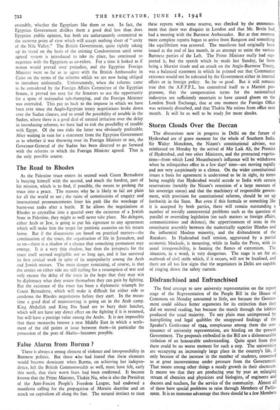Storm Clouds Over the Deccan
The discussions now in progress in Delhi on the future of Hyderabad are of grave moment for the whole of Southern India. Sir Walter Monckton, the Nizam's constitutional adviser, was reinforced on Monday by the arrival of Mir Laik Ali, the Premier of Hyderabad, and two other Ministers, and the protracted regotia- tions—from which Lord Mountbatten's influence will be withdrawn when he relinquishes office in a few days' time—are moving rapidly and not very auspiciously to a climax. On the wider constitutional issues a basis for agreement is understood to be in sight, its terms being roughly that Hyderabad would accede to India with certain reservations (notably the Nizam's retention of a large measure of his sovereign status) and that the machinery of responsible govern- ment, with provision for constitutional reforms, should be set up forthwith in the State. But even if this formula or something like it is accepted by both parties, there will remain outstanding a number of torridly controversial problems such as the question of parallel or overriding legislation (on such matters as foreign affairs, communications and defence), the apportionment of seats in the constituent assembly between the numerically superior Hindus and the influential Moslem minority, and the disbandment of the Razakars. In Hyderabad itself tension, aggravated by a partial economic blockade, is mounting, while in India the Press, with its usual irresponsibility, is fanning the flames of extremism. The situation, in a word, is very dangerous. The stage is set for an outbreak of civil strife which, if it occurs, will not be localised, and there are all too few signs that the negotiators in Delhi are capable of ringing down the safety curtain.


































 Previous page
Previous page